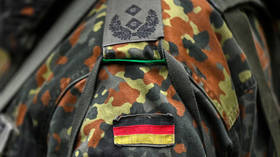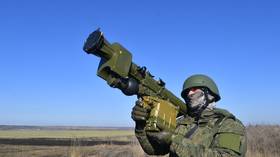Only 17% of Germans ready to defend their country – survey

A recent survey conducted by the German market and opinion research institute, Forsa, reveals that many German citizens are hesitant to defend their country with lethal force in the event of potential foreign aggression. According to the poll commissioned by the Stern newspaper, 40% of respondents expressed that they would never take up arms, even in such circumstances.
Only 17% of Germans indicated they would “definitely” be prepared to defend their nation. An additional 19% stated they would “probably” do so in the event of an attack on Germany. Notably, older men demonstrated a higher level of potential readiness, with 39% of male respondents aged between 45 and 59 expressing willingness to join Germany’s defense forces in case of a foreign invasion.
Overall, 61% of Germans revealed they were either “probably” or “totally” unwilling to take up arms against a potential aggressor. The poll, conducted in mid-November, highlighted that the number of individuals categorically denying any possibility of doing so has doubled since May 2022. Additionally, it noted that people with middle and higher education were more reluctant to rush to their nation’s defense.
The German Armed Forces, known as the Bundeswehr, currently comprises around 180,000 personnel. Germany suspended compulsory conscription in 2011 as part of a military reform, contributing to a prolonged struggle to fill army ranks under the government’s austerity plan.
The nation has since been struggling to refill its army ranks for years. In 2018, then-Defense Minister Ursula von der Leyen aimed to boost the number of German troops to 203,000 by 2025. Current Minister of Defense Boris Pistorius has pushed the deadline to 2031 while keeping the same target.
In mid-December, Germany’s Bild tabloid reported that the Bundeswehr was still losing staffing despite the government’s pledges to increase the army ranks. The number of armed forces personnel dropped from roughly 183,000 in the summer to 181,383 as of the end of October, with thousands of vacancies unfilled, the paper reported at that time, adding that only 0.4% of the total German population was in the military.
The report also highlighted challenges in Germany’s military hardware, citing a shortage of operational main battle tanks. In late November, German MP Dr. Johann Wadephul criticized the under-funding and under-equipped status of the Armed Forces, stating that some “critical” units would last no longer than two days in battle – a situation he deemed “catastrophic.”
Wadephul also raised concerns about Germany's military aid to Kiev, arguing that the German army ultimately suffered losses as replacements purchased for the Bundeswehr often ended up in Ukraine.
Germany has emerged as Ukraine’s second-largest military donor, pledging over €17 billion ($18.6 billion) in military aid. The assistance included Leopard tanks, Patriot anti-aircraft missile systems, artillery, and almost 22,000 rounds of 155mm ammunition, among other supplies. German Foreign Minister Annalena Baerbock reaffirmed in November Berlin’s commitment to expanding and increasing military aid to Kiev.














